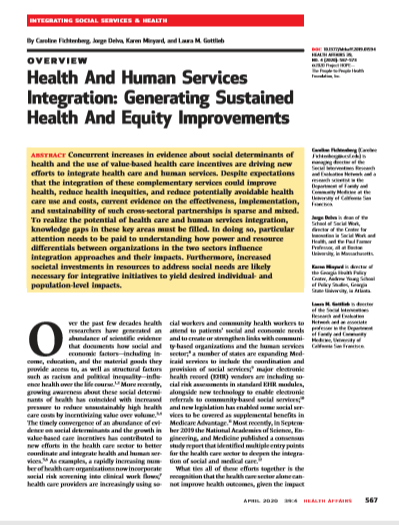
Health And Human Services Integration: Generating Sustained Health And Equity Improvements
This Health Affairs article summarizes the characteristics of current health and human services integration efforts, synthesizes key evidence on the effectiveness of different integration activities, and highlights associated gaps in the evidence and critical implementation challenges.
Concurrent increases in evidence about social determinants of health and the use of value-based health care incentives are driving new efforts to integrate health care and human services. Despite expectations that the integration of these complementary services could improve health, reduce health inequities, and reduce potentially avoidable health care use and costs, current evidence on the effectiveness, implementation, and sustainability of such cross-sectoral partnerships is sparse and mixed.
To realize the potential of health care and human services integration, knowledge gaps in these key areas must be filled. In doing so, particular attention needs to be paid to understanding how power and resource differentials between organizations in the two sectors influence integration approaches and their impacts. Furthermore, increased societal investments in resources to address social needs are likely necessary for integrative initiatives to yield desired individual- and population-level impacts.
Co-authors include:
- Karen Minyard, chief executive officer of the Georgia Health Policy Center, which leads the Aligning Systems for Health initiative
- Laura Gottlieb, founding director of the Social Interventions Research and Evaluation Network
- Caroline Fichtenberg, managing director of the Social Interventions Research and Evaluation Network
- Jorge Delva, director of the Boston University School of Social Work Center for Innovation in Social Work and Health

 Back to Resources
Back to Resources